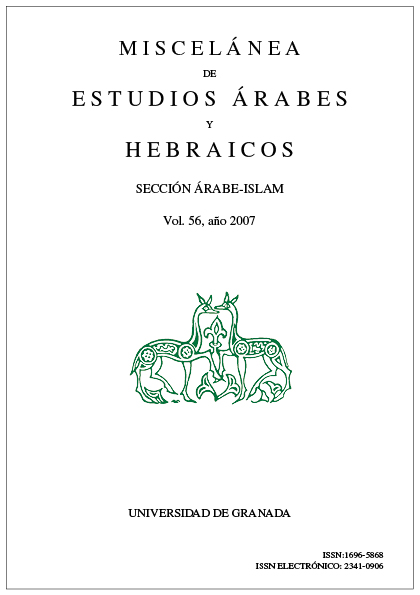Donación de aguas de Mahomad Abencaxon a los habices de la mezquita de Acequias (Valle de Lecrín) en 1440. Pleitos entre los vecinos en época cristiana
Palabras clave:
Habices, Valle de Lecrín (Granada), Pleitos, Mezquitas, Regadío, AgriculturaResumen
Un vecino de la alquería de Mondújar, llamado Mahomad Abencaxon, en 1440, donó media noche de agua para las tierras de la mezquita del lugar de Acequias, localidad del Valle de Lecrín. Estos bienes habices pasaron a las iglesias tras la conquista de las tierras musulmanas. Años más tarde se plantearon algunos pleitos por estas aguas. Entre ellos unos vecinos de Acequias cortaron el agua a Juan Maldonado Hafiz, que tenía arrendadas las tierras. Este los denunció ante las autoridades del Valle de Lecrín. Se inicia un pleito que será juzgado por las justicias de Granada. Se condena a los infractores. Los testimonios de los testigos presentados nos permiten conocer nuevas noticias y costumbres sobre el pasado musulmán de esta comarca del reino nazarí de Granada.Descargas
Descargas
Publicado
Cómo citar
Número
Sección
Licencia
Los autores que publican en esta revista están de acuerdo con los siguientes términos:
1. Los autores conservan los derechos de autor y garantizan a la revista el derecho de ser la primera publicación del trabajo al igual que licenciado bajo una Creative Commons Attribution License que permite a otros compartir el trabajo con un reconocimiento de la autoría del trabajo y la publicación inicial en esta revista.
2. Los autores pueden establecer por separado acuerdos adicionales para la distribución no exclusiva de la versión de la obra publicada en la revista (por ejemplo, situarlo en un repositorio institucional o publicarlo en un libro), con un reconocimiento de su publicación inicial en esta revista.
3. Se permite y se anima a los autores a difundir electrónicamente (por ejemplo, en repositorios institucionales o en su propio sitio web) la versión publicada de sus trabajos (versión post-print del editor) o, en su defecto, el de la versión post-print del autor ya evaluada y aceptada. Esto puede dar lugar a intercambios productivos, así como a una citación más temprana y mayor de los trabajos publicados (Véase The Effect of Open Access).
4. La revista no se hace responsable de las opiniones vertidas por los autores.















